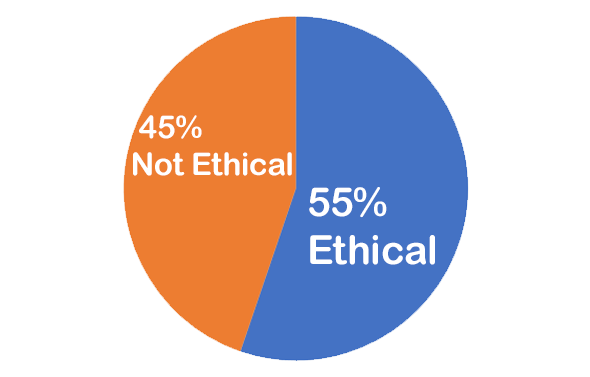This is the March 2024 edition of our monthly series of Ethics case studies titled What Do You Think? This series is comprised of case studies from NSPE archives, involving both real and hypothetical matters submitted by engineers, public officials, and members of the public.
Your peers and the NSPE Board of Ethical Review have reviewed the facts of the case as shown below. And, here are the results.
Your opinion has been registered for the March 2024 edition of our monthly series of Ethics case studies titled What Do You Think?
Your vote is recorded as:

Want to know how your peers voted? We’ll send you an email with the poll results on
March 26.
Your opinion has been registered for the March 2024 edition of our monthly series of Ethics case studies titled What Do You Think?
Your vote is recorded as:

Want to know how your peers voted? We’ll send you an email with the poll results on
March 26.
A Review of the Facts
A client hires Engineer Daniel to furnish complete engineering services for a specific project. Because of the potentially dangerous nature of implementing the design during the construction phase, Daniel recommends to the client that a full-time, on-site project representative be hired for the project. After reviewing the completed project plans and costs, the client indicated to Daniel that the project would be too costly if such a representative were hired. Daniel proceeds with his work on the project.
What Do You Think?
Was it ethical for Daniel to proceed with his work on the project knowing that the client would not agree to hire a full-time project representative?
Here is the result of our survey of your peers:

Applicable NSPE Code References:
II.1.a
“If engineers’ judgment is overruled under circumstances that endanger life or property, they shall notify their employer or client and such other authority as may be appropriate.”III.1.b
“Engineers shall advise their clients or employers when they believe a project will not be successful.”
Discussion
The issue presented in this case goes to the heart of the Code of Ethics. A code of ethics is of course a statement of commitment from a particular profession to assist its members in the protection of public health and safety. There is probably no better or more valuable purpose for a code of ethics. Engineers, like all other licensed professionals, recognize that the reason for regulation and licensure is the protection of public health and safety. However, engineers have the desire and commitment to “go the extra mile,” and voluntarily commit themselves to a higher standard of conduct. It is for that reason that the NSPE Code of Ethics was developed and continues to develop as a force in engineering ethics.
This point is quite relevant to the discussion of this case. Under the facts, Daniel made a professional judgment based on education, expertise, and experience that a full-time, on-site project representative would be necessary during the construction phase of the project because of the dangerous nature of the project. This was presumably a determination that was made after a careful and thorough weighing of the costs of the full-time, on-site project representative versus the benefits of having such a representative. It may very well be that the state engineering registration board’s rules of professional conduct may not specifically require Daniel to make the determination that was made; however, it appears that the NSPE Code of Ethics does contain provisions that address this point.
Code III.1.b. clearly requires the engineer to inform a client when the engineer believes that a project will not be successful. The term “successful” includes not merely the structural and economic success of a project but also the success of the project from a safety standpoint. It is clear from the facts that Daniel did notify the client of the need to hire a full-time, on-site project representative for the construction phase of the project. Therefore, Daniel did act in accordance with Code III.1.b.
Code II.1.a. admonishes engineers to recognize that their primary obligation is to protect the public safety, health, property, and welfare. Under the facts of this case, it appears that Daniel did not recognize this primary obligation. Daniel, using their best professional judgment, made a recommendation based on what was believed to be consistent with that obligation. However, when cost concerns were raised by the client, Daniel abandoned the ethical duty and proceeded with work on the project. It appears that Daniel acted in a manner that suggests that the primary obligation was not the public but the client’s economic concerns. For that reason, Daniel was in violation of Code II.1.a.
When the client indicated that the project would be too costly if a full-time, on-site project representative were hired, Daniel acceded to the client’s wishes and proceeded with the work despite the fact that Daniel believed that to proceed without an on-site project representative would be potentially dangerous. Daniel did not force the issue or insist that a project representative be hired. Instead, Daniel “went along” without dissent or comment. If Daniel’s ethical concerns were real, which we presume they were, Daniel should have insisted that the client hire the on-site project representative or refuse to continue to work on the project. While this might appear to be a harsh result, we think that such an approach is the only one that would be consistent with the Code of Ethics.
The Ethical Review Board’s Conclusion

It was unethical for Daniel to proceed with work on the project knowing that the client would not agree to hire a full-time, representative.
BOARD OF ETHICAL REVIEW
Louis A. Bacon, P.E. F. Wendell Beard, P.E. James G. Johnstone, P.E. Robert H. Perrine, P.E. Marvin M. Specter, P.E.-L.S. L.W. Sprandel, P.E. Robert R. Evans, P.E., chairman
Note – In regard to the question of application of the Code to corporations vis-a-vis real persons, business form or type should not negate nor influence conformance of individuals to the Code. The Code deals with professional services, which services must be performed by real persons. Real persons in turn establish and implement policies within business structures. The Code is clearly written to apply to the Engineer and it is incumbent on a member of NSPE to endeavor to live up to its provisions. This applies to all pertinent sections of the Code. This opinion is based on data submitted to the Board of Ethical Review and does not necessarily represent all of the pertinent facts when applied to a specific case. This opinion is for educational purposes only and should not be construed as expressing any opinion on the ethics of specific individuals. This opinion may be reprinted without further permission, provided that this statement is included before or after the text of the case.









They should have used that he thought it was ‘necessary’ in the ‘facts’. It just says he recommended it, but doesn’t say initially he felt it was obligatory. Also they initially said ‘potentially dangerous’ then all of the sudden in the answer, dangerous. It left open the possibility there were other measures that could be taken to mitigate the dangers besides having a representative on site.
“Because of the potentially dangerous nature of implementing the design during the construction phase, Daniel recommends to the client…”
“on-site project representative would be necessary during the construction phase of the project because of the dangerous nature of the project.”
this case also goes to means in method, because it has to do with ‘implementing’ the design. Just because a client doesn’t have a representative on hand, that doesn’t mean that the contractor won’t have safety in place or even higher his own representative to oversee the safety of his crew.
This is a concern for many projects. Daniel, given his client’s cost restraint, could adjust his design to safely accommodate. He could slow the work down to meet both the quality and cost restraints showing the client his ability to keep cost in line while still maintaining quality / safety.
A little more information is needed. The article states “Because of the potentially dangerous nature of implementing the design during the construction phase”. Does this statement mean loss of life, damage to property, schedule delays?
This seems to be another ethical case where we are asked to choose between two black-and-white options. Daniel either quits or he doesn’t quit.
If Daniel quits, what’s to say the next engineer will come to the same risk assessment as Daniel? Or that the next engineer won’t come up with a different design?
If Daniel stays on the job, then he and the client should work together to find ways to reduce the risk. Perhaps the design or process could be modified.
Nothing says he can’t quit later.
If I had quit every time I found an obstacle, I’d be very ethical and very unemployed.
Based upon the wording of the situation, I completely disagree with the conclusion. Allow me an example. An engineer is design a lighting system for a workroom. The client mentions that they will occasionally be utilizing alcohol to swab some components in the room. The Engineer, expressing concern from “the potentially dangerous nature of electrical sparks around flammable products” when turning on the lights, recommends they install explosion proof fixtures/switches. The client does not agree, citing exorbitant material costs. Is this unethical? I dare say it’s an example of an Engineer being overly cautious. The client is not required to agree with everything an engineer recommends.
Daniel was under contract to furnish “complete engineering services” for the project. As such, Daniel. being the engineer-of-record, would still be responsible by his contract to periodically visit the site for progress verification, respond to “request-for-information” from the contractor, respond to unforeseen complications on the project site, shop drawings reviews, and reviewing other contractor submittals required by the construction contract that many times includes the contractors written plans for implementing the more critical tasks of the project.
Daniel’s “recommendation” was dutifully considered “after reviewing the completed project plans and costs “but it did not eliminate the follow-up contract involvement by Daniel through the construction phase as indicated as “complete engineering services”. The phrase,”potentially dangerous”, can be applied to most construction contracts!
I’ve enjoyed reading the comments by others on this one. There seems to always be some vagueness to these scenarios which sparks good thought and discussion. But this one seems to be lacking more detail than normal to help us better understand the dilemma. It appears that at best there were options that could have been explored to remediate the problem. And if options were pursued to no avail, the way the narrative is written suggests that the engineer did not communicate his concern very emphatically. To me, a recommendation is a suggestion which one can opt to decline. If he had stated that this was an essential requirement which was declined, that would be delineate the ethical/not ethical question better. Someone else stated that if Daniel had chosen to walk away from the job, someone else could come behind him and provide the services as asked by the owner. This is a valid point. Then the big question is: which engineer is wrong? Maybe the other engineer is being careless…maybe not. Maybe Daniel is being unnecessarily cautious…maybe not. As always, these provide good exercises for us to evaluate so we make good ethical decisions in our own encounters.
Agree that “potentially dangerous” needs to be defined. Is this a rocket fuel manufacturing facility or a facility where someone could slip on spilled water? Whatever it is, Daniel felt that the risk justified a full-time on-site project representative. By abandoning his original assessment it seems that Daniel is not holding public safety paramount.
More detailed information as to why Daniel decided to proceed is needed to be stated for me to draw a conclusion.
If I were Daniel, I would have asked the client IF they wanted me to continue the work. If they said “YES” then I would be asking how we are going to mitigate the need for an “On-site” person. We could then discuss whether the present contractor can cover the needed/required site evaluations or if they are expecting me to be at the site daily to monitor the site work. That is when, Daniel, can decide if he is willing to be on-site every day and if this changes his contract with them. I have had people contract me to do a specific task in their plant, but when I tell them this work will exceed the amount they have budgeted, I stop all work until it is resolved. This way neither I nor the client are left holding the bag for work completed with no money to cover the costs or left incomplete..
“potential” danger during construction and “recommendation” for on-site project manager left out a lot of information which should have been in the client review. Did the review include the possibility the construction contractor or owner had/would have personnel able to monitor and manage the risks making a separate on-site representative an unjustifiable extra cost? If so, was Daniel part of the review before proceeding? Having been on both sides during my career, I gave the benefit of the doubt that Daniel proceeded after having aired his concerns and that procedures were in place even if not his recommendation. The board decision discussion provided more information that would have been helpful in the initial description, particularly that he “acceded” and a much stronger “belief”.
this is a difficult situation I think under the give situation one needs more information. I don’t think Daniel should quit but should discuss the needs with the owner to a greater extent.
We are engineers, not police. Code II.1.a does not say “If engineers’ judgment is overruled under circumstances that endanger life or property, they shall quit the project and refuse to do the work until they are obeyed.” The board’s interpretation of this case suggests that it is our ethical responsibility to force our clients to do what we want if we cite safety as our concern, but we do not have that kind of authority. Sure, we can take our ball and go home, but that’s childish and passive-aggressive and accomplishes nothing in the end. It is better than Daniel remain on the project and continue to pursue safety considerations such as attempting to design in engineering controls to mitigate the risks. At worst, Daniel can notify an Authority Having Jurisdiction about his concerns and appeal to them to enforce safe practices.
The phrase “recommends” is not an absolute stipulation that someone must be hired to implement the design during construction. and is a weak term. We could debate whether by allowing the design to be implemented without a full-time representative is indeed overruling the Engineer. As several people note above more information is needed.
Every project has a budget. And the people who hold the purse strings for the project can influence various decisions based on the risk they are willing to take. This puts the engineer in the crosshairs of making very unique decisions with regard to safety and ethics.